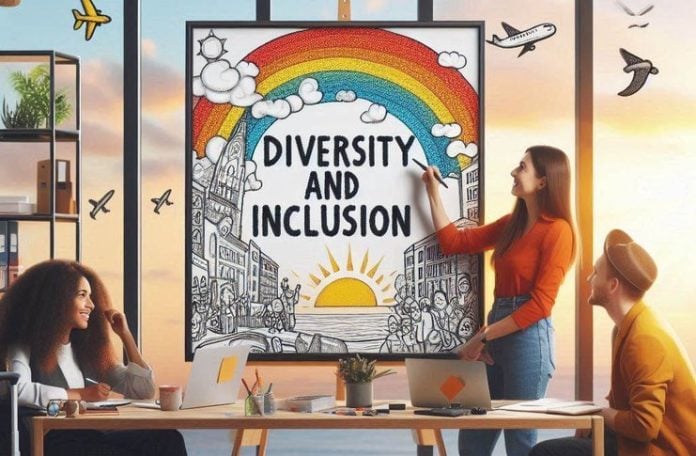
Key Takeaways:
- Understanding the nuances of diversity and inclusion (D&I) is essential for creating healthy, high-performing workplaces within the travel sector.
- As travel companies strive to provide exceptional experiences for diverse travelers, embracing D&I becomes a strategic imperative.
Expanding Definitions: Diversity and Inclusion in Today’s Travel Workplace
The lexicon of the modern travel workplace is continuously evolving, especially concerning diversity and inclusion. Beyond the traditional factors—such as race, ethnicity, and gender identity—travel companies now recognize the importance of diversity of thought, cultural backgrounds, and unique travel experiences. Inclusion goes beyond mere acknowledgment; it’s about actively empowering all employees to participate fully and authentically. By fostering a corporate environment as vibrant and diverse as the destinations they serve, travel companies create a richer tapestry of ideas and perspectives. The interplay between these elements forms the core of a nuanced D&I strategy.
The Competitive Edge: Benefits of Diversity and Inclusion in Travel
When companies commit to I&D, they unlock a range of benefits that extend throughout their organization. Here’s how:
- Creativity and Innovation: A diverse workforce brings fresh perspectives, leading to greater creativity and innovation. Travel companies that embrace diverse viewpoints are better equipped to capture new markets and create memorable travel experiences.
- Employee Satisfaction and Retention: Inclusive workplaces foster job commitment and satisfaction. Happy employees provide better customer service, which directly impacts travelers’ experiences. Reduced staff turnover also minimizes disruptions and costs.
Watch this video to learn more:
Strategies for Cultivating Diversity in the Travel Industry
- Make I&D a Priority: From offering autism-friendly kids’ camps to providing advancement opportunities for under-represented groups within their organizations, travel companies must commit to and bring to life I&D practices that align with their customers’ values of I&D. Research shows that 56% of travelers say it’s important that the company they book with is committed to I&D practices. Additionally, 3 out of 5 travelers emphasize the importance of their preferred travel provider demonstrating a commitment to I&D values similar to their own. Furthermore, 50% of travelers are willing to pay a premium of 5% to 20% to book their travels with a company that values I&D.
- Boost I&D Practices for All: Travel companies without a strong culture of I&D fail to gain and retain customers. By publicly reflecting inclusive practices and I&D values similar to their customers, these companies can foster true customer loyalty. 3 out of 5 travel executives report that it is more difficult than ever to win customer loyalty, and 2 out of 5 travelers will switch providers if a company does not publicly reflect inclusive practices. Moreover, 75% of travelers will switch providers if their preferred company doesn’t offer them a welcoming environment or treat them fairly.
- Deliver Inclusive Customer Experiences: When it comes to representing I&D principles to travelers, travel companies must offer more customized experiences that account for factors like age, ability, gender, gender identity and expression, religion, and sexual orientation. 82% of travelers value feeling welcomed and being treated fairly, while 74% care about whether a company offers a range of products and services to make those in their diverse segment feel included.
Navigating Unconscious Bias: Promoting Equity in the Travel Industry
Unconscious bias, deeply ingrained in human psychology, influences our behaviors and decisions, often to the detriment of marginalized groups. In the context of the travel industry, recognizing and addressing these biases is essential for creating a more inclusive and equitable environment. Here are practical steps travel companies can take:
- Acknowledge and Tackle Biases: Openly discuss biases to create awareness and encourage collective efforts to overcome them.
- Create Communities of Practice: Establish forums for sharing experiences and strategies to address unconscious bias.
- Provide Evidence-Based Training: Implement scientifically tested training programs to reduce implicit biases.
- Encourage Skill Development: Stay informed about the latest research on unconscious bias and apply that knowledge.
- Recognize Efforts: Validate and reward employees actively working to reduce bias.
- Allocate Resources: Invest in bias reduction initiatives through funding and evaluation.
- Leadership Accountability: Hold travel industry leaders responsible for promoting equity and participating in bias-reduction initiatives.
Beyond Numbers: The Heartbeat of Travel Companies
Cultivating an inclusive culture within travel companies requires intentional and persistent efforts. Beyond mere tokenism, true inclusion involves embedding inclusivity into the very fabric of the organization. Here’s how travel companies can create an environment where every employee has a seat at the table and a voice that matters:
- Language and Communication:
- Inclusive Language: Use language in corporate communications that reflects diversity and respect. From job descriptions to internal memos, words matter. Inclusive language ensures that all employees feel seen and valued.
- Flexible Policies for Diverse Lifestyles:
- Work-Life Balance: Recognize that travel industry professionals have diverse lifestyles. Flexible work policies—such as remote work options, family-friendly leave, and accommodations for different schedules—promote well-being and inclusivity.
- Cultural Sensitivity: Travel companies operate in a global context. Understanding cultural nuances and celebrating diverse holidays and traditions fosters a sense of belonging.
- Networks and Support Systems:
- Employee Resource Groups (ERGs): Establish ERGs that cater to various demographics (e.g., LGBTQ+, women, veterans). These groups provide a safe space for employees to connect, share experiences, and advocate for positive change.
- Mentorship Programs: Pairing employees with mentors from different backgrounds encourages professional growth and cross-cultural understanding.
- Inclusive Professional Development:
- Training and Education: Offer workshops and training sessions on topics like unconscious bias, cultural competence, and allyship. Continuous learning ensures that employees stay informed and open-minded.
- Promote Diverse Leadership: Encourage employees from underrepresented groups to pursue leadership roles. Representation matters, and diverse leadership enriches decision-making.
Metrics That Matter: Measuring the Impact of Diversity and Inclusion
With measurable outcomes, D&I initiatives can become abstract and practical. Proper metrics and regular evaluations help organizations track their progress and demonstrate the tangible impact of their diversity strategies. This can include analyzing demographic data across various company levels, assessing minority representation in leadership roles, and conducting surveys that gauge employee sentiment on inclusivity.
Another valuable metric is the assessment of diversity in the company’s supply chain and consumer base, which can reflect the organization’s broader commitment to D&I. By quantifying these elements, businesses can set meaningful goals, hold themselves accountable, and continue to refine their approaches in pursuit of a genuinely inclusive corporate culture.
Champions of Change: The Pivotal Role of Leadership in D&I
D & I initiative can only succeed with the wholehearted commitment of an organization’s leadership. Their attitudes and actions are immensely influential; when leaders visibly and actively support diversity and inclusion, it reverberates throughout the company, creating an environment where these values are lived and breathed every day.
This support might involve participating in awareness programs, advocating for policy changes, and fostering inclusive leadership strategies that influence the company’s strategic direction. Truly committed leaders go beyond lip service, serving as role models and actively seeking feedback to improve the culture continuously.
Watch this video to see how a travel group implements it well:
Building Bridges: The Power of Allyship in the Travel Industry
In the dynamic travel and tourism sector, allyship is a catalyst for positive change. It occurs when individuals from privileged groups actively advocate for and support those from underrepresented or marginalized backgrounds. Here’s how allyship contributes to an inclusive workplace:
1. Listening and Learning:
Allies actively listen to diverse perspectives. Whether it’s a traveler’s story or an employee’s experience, understanding fosters empathy.
2. Challenging Discrimination:
Allies speak up against bias and discriminatory behavior. In the travel industry, this means ensuring fair treatment for all travelers.
3. Amplifying Voices:
Diverse voices enrich our travel experiences. Allies amplify those often unheard—the solo traveler, the LGBTQ+ couple, or the local guide.
4. Supporting Growth:
Beyond empathy, allies actively support colleagues’ professional development. Mentorship and equal opportunities matter.
5. Shared Responsibility:
Regular allyship training empowers everyone. Inclusivity becomes part of the corporate ethos.
As we reimagine travel, let’s remember that allyship isn’t just a buzzword—it’s our compass toward a more connected world.
A Worldwide View: Integrating Global Perspectives into D&I Strategies
For travel companies operating on a global scale, D&I strategies must be adapted to fit a wide array of cultural contexts, respecting local norms while striving to maintain core values of inclusivity. These companies must engage with local leaders and employees to understand regional nuances and craft policies reflecting a coherent commitment to diversity transcending geographical boundaries. This global-minded approach ensures compliance with local legislation. It signals a genuine respect for the rich tapestry of cultures within the company, promoting an international sense of unity and shared goals.
In an increasingly interconnected world, the imperative for diversity and inclusivity within the corporate sphere becomes ever more urgent. The strategic incorporation of these principles into travel business operations is no longer a ‘nice-to-have’ but a critical component of success in the 21st century. Companies that embrace D&I are proven more innovative, adaptable, and ultimately more successful. These efforts echo far beyond the corporation’s walls, promoting social progress and modeling a professional future where everyone can thrive. The journey toward an inclusive workplace is ongoing; it requires time, dedication, and, most importantly, a commitment to continuous improvement. Only then can organizations unlock the full potential that D&I promises for everyone involved.









